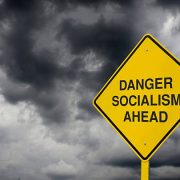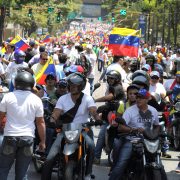Richard M Ebeling has calculated a deeply depressing statistic. There are about 525 million government bureaucrats on this planet. That’s about 7% of all humans, and 15% of all humans in the global labor force. Their job, as Ebeling puts it, is
supporting,…… overseeing, and enforcing all of those laws, regulations, and redistributive policies determining how the remaining 6.9 billion people on this earth shall live and work.
We who are members of the 6.9 billion rely on our individual knowledge and our individual ability to collaborate and trade with any other individual when both parties voluntarily identify a mutually beneficial exchange. I’ll work for you if you pay me an amount I find acceptable. I’ll buy what you’re selling if you offer me a value I find acceptable. We’ll find a way that’s a win-win for both of us.
How do we make it work among the 6.9 billion? How do we make it possible for a Mom in Minnesota to buy her son a T-shirt made in China that’s transported on a train driven by a Chinese engineer, possibly driving a GE locomotive, to a ship of Liberian registry, which docks in North America and connects to UPS logistics to get the garment to the local Target store.
We know the equation that makes this possible: individual knowledge plus individual freedom. As Ebeling puts it,
Almost 75 years ago, the Austrian economist and Nobel laureate Friedrich A. Hayek published one of the most notable economics articles of the 20th century, “The Use of Knowledge in Society” (1945). The gist of his argument is that matching the social system of division of labor is an accompanying division of knowledge; this knowledge encompasses many different and textured forms that are only acquired and fully known and appreciated by the multitudes of individuals each in his own corner of what is now a truly global society.
If all the knowledge of the world is dispersed among all the minds of all the individuals in the world, how might we somehow make it accessible and useable so all in society may benefit from what others know? Hayek’s answer was the institutions of competitive free markets and prices freely formed by the interactions of supply and demand. The free market price system does it all.
We, the 6.9 billion, communicate – by buying and selling, by consuming and producing, and by saving and investing – what we want and what we might able and willing to supply in return. And the price system does this, Hayek argued, with the minimum information needed for this multitude of market participants to coordinate their actions.
It all works fine until the hubris of politicians and bureaucrats enter the picture; they believe they can design and impose government policies to direct the actions of the 6.9 billion;
where industries and enterprises are to be located and what types and quantities of goods they will be producing; what types of jobs will be made available, in which locations, and satisfying whose consumer and producer demands; which resources and raw materials will be utilized in making what products with which methods of production; and who will earn what income and in what amount compared to others.
Every such decision, when it is made by a bureaucrat, preempts the decisions of the 6.9 billion about what to produce, where, with which methods of production, in what quantities, for whose uses, and at what prices and wages.
The economic, social, and cultural life of the 6.9 billion in society is placed within the straitjacket of what the 750 million in government know and consider good or desirable. Innovations and other adaptations to changing circumstances are confined by the restrictions enforced on private enterprises by the bureaucrats in charge; the directions and forms of production are artificially shaped by fiscal penalties and subsidies and by the spider’s web of regulatory restraints.
People’s abilities to discover and pursue ways of improving their own social and material circumstances by improving those of their fellow human beings through free and open exchange – whether between individuals in one neighborhood or one country or in different parts of the globe – is hampered if not halted by bureaucratic restrictions.
Humans talk to each other and collaborate with each other through the prices of the global marketplace. Everyone participating in this international marketplace must have a wide latitude of individual liberty to use their personal knowledge, which they possess and others do not. Only through a respect for and practice of such freedom can all the knowledge of the world be effectively utilized to improve the circumstances of the individuals possessing it, as well as others who simultaneously gain from its effective use on their behalf in the form of goods or services they would like to acquire.
Another distinct contribution of Hayek’s was to highlight that competition is a “discovery procedure.” If we already knew the outcome of some competitive activity, what would be the point of holding the competition to begin with? It is precisely because we cannot be certain of the outcome before the competition is held that we see the benefit from the rivalry.
That’s another reason why liberty is such a great means to many of our ends. The freedom of others is a social good because by each having the liberty to decide and act on their own knowledge, the rest of us can be the beneficiaries of what they know and can do that which we could not for ourselves — or at least not as well and as inexpensively as they can for us. We should, at the same time, value an economic system that encourages the competitive discovery process that enables all to benefit from the ideas that someone may come up with that potentially enrich the lives of many if not all of the billions of people in the world.
We take for granted the miraculous ability technology has now given us to travel to and communicate with virtually any place on the planet in little or no time. Yet we allow governments and their bureaucracies to use their coercive powers to constrain us from having the full freedom to create, produce, trade, and travel to pursue our mutually beneficial purposes and cooperative plans to peacefully and productively make our lives better.
What the world needs is more personal freedom and economic liberty so we each may be the voluntary means to each other’s ends through the marketplace of ideas, employments, and products as we use our individual knowledge in our shared global society. The 6.9 billion of us should not be handicapped by what those 525 million bureaucrats can know and do.
Adapted from The Global Economy Desperately Needs Freedom by Richard M Ebeling, polished at AIER.org on 3-6-19, which was, in turn adapted from the Joan Thompson Memorial Freedom Lecture, given at the University of the Bahamas on March 1, 2019.













